stdClass Object
(
[id] => 20552
[title] => Freedom in the gratuitousness of those three wise men who came from the East
[alias] => freedom-in-the-gratuitousness-of-those-three-wise-men-who-came-from-the-east
[introtext] => When the good spirit of giving infects the gift
by Luigino Bruni
published in L'Osservatore Romano on January 5, 2026
Carlo Levi, in his Christ Stopped at Eboli (1945), recounting Christmas Eve spent in his confinement in Basilicata, wrote: “I too had to receive bottles of oil, wine, and eggs that day, and the donors were surprised that I did not accept them as a mandatory tithe... What a strange gentleman I was, then, if the traditional reversal of the story of the Magi did not apply to me, and one could enter my house empty-handed?” A reversed Gospel tradition, therefore, because while those wise men in Matthew's Gospel brought gifts to a poor family, the Christian lords of Gagliano demanded gifts from the poor and from the women: “But here, where Christ had not come, the three Kings had never been seen either.”
[fulltext] =>
Gifts and presents are not the same thing, because while gifts are experiences of gratuitousness and freedom on both sides of the relationship, presents (regali, from rex, regis) are asymmetrical in nature, where someone richer and greater gives an object to someone smaller or poorer - and vice versa. So presents are not always good things. The gifts of the Magi are therefore presents, but we like them because they are gifts-presents, one of the rare occasions when these two often opposing experiences come together, and the good spirit of the gift infects the present.
Magi is a special word in the Gospels, almost a neologism (a bit like ‘thieves’). From Greek to ancient Italian, via Jerome's Latin, those magoi were not translated as ‘magicians’ but as magi, an Italian word that preserves the Latin lemma and does not have a singular form ‘magio’: ‘They are therefore called magi, that is, wise men’ (Legenda Aurea, 14th century). For many centuries, however, the gifts of the magi remained only in the nativity scene, because the concrete experience of Christian people was the ‘reversed’ one described by Carlo Levi. Gifts were, in fact, those that the poor had to give to the powerful, to the lords, to the priests, or those rare ones that the poor sometimes received from their masters, but at their total discretion: “The gods do not grant gifts to everyone” (Odyssey, VII).
During Humanism and then in the Renaissance, wealthy Italian merchants appropriated certain religious symbols to ethically legitimize their new wealth and emancipate themselves from Dante's judgment: ‘la gente nova e i sùbiti guadagni’ (Inferno XVI,64). Among these, the Magi stand out: those rich lords who became ‘kings’ during the Middle Ages, rich men who worshipped Christ with gold and gifts, were perfect for the new economic ethics of the city's wealthy. In Florence, the prestigious Compagnia dei Magi, an important association of merchants, had been active since the end of the 14th century. In many churches of those centuries, there are frescoes depicting the Magi, including the Dominican convent of San Marco, where the spectacular Epiphany procession ended: ‘Three Magi with a cavalry of more than 200 horses adorned with many magnificences came to offer gifts to the newborn Christ’ (Matteo Palmieri, 1454). The icon of the Magi was therefore central to the first alliance between merchants and Christianity, which is at the origin of Catholic capitalism based more on beauty and magnificence than on God's ‘predilection’, as happened centuries later in the Protestant and Calvinist spheres.
The presence of the Magi in the nativity scene tells us important things about gifts and presents. First of all, gifts, although an expression of asymmetrical relationships, can also be good. An adult can give a nice gift to a child, a wealthy person to a poor person, a wise person to an ignorant person (all asymmetrical relationships); but - another message - the art of gift-giving is very difficult to learn and practice, much more difficult than the art of giving. Too often, in fact, gifts have not been and are not experiences of gratuitousness or freedom, but only of obligation, necessary gifts that reinforced hierarchies, inequalities, and social injustice, which the church sometimes sanctified.
Furthermore, the Magi were men, males who know how to give. And in a time like ours, when a dark fog has gathered around men, preventing us from seeing even the beautiful aspects of masculinity (the word has almost become a swear word), these men who give gifts are a message of hope that one day women will be able to look at men with the same eyes with which Mary looked at those three wise men who came from the East.
Finally, there is the beautiful story The Fourth Wise Man by Henry Van Dyke (1852-1933), the story of a fourth wise man, Artaban, who set out with the other magi with treasures to give to the child, but on the way he stops to help a dying man, loses the caravan, and gets lost. He thus arrives in Bethlehem too late. He searches for Jesus for over thirty years and uses all his treasures to help the poor. He arrives in Jerusalem just as Jesus dies, but does not recognize him. Before he dies, convinced that he has failed in his life, he prays: "Ah, Master, I have searched for you so much. Forget me. Once I had precious gifts to offer you. Now I have nothing left.“ And Jesus said, ”Artaban, you have already given me your gifts.“ Artaban: ”I don't understand, my Lord...“ Jesus: ”When I was hungry, you gave me food; when I was thirsty, you gave me drink... When I was homeless, you took me in.“ Artaban: ”That's not true..." Jesus: “When you did these things for the least, for the smallest of my brothers, you did them for me.”
[checked_out] => 0
[checked_out_time] => 0000-00-00 00:00:00
[catid] => 891
[created] => 2026-01-06 07:25:42
[created_by] => 64
[created_by_alias] => Luigino Bruni
[state] => 1
[modified] => 2026-01-06 10:57:47
[modified_by] => 64
[modified_by_name] => Antonella Ferrucci
[publish_up] => 2026-01-06 07:25:42
[publish_down] => 0000-00-00 00:00:00
[images] => {"image_intro":"","float_intro":"","image_intro_alt":"","image_intro_caption":"","image_fulltext":"","float_fulltext":"","image_fulltext_alt":"","image_fulltext_caption":""}
[urls] => {"urla":false,"urlatext":"","targeta":"","urlb":false,"urlbtext":"","targetb":"","urlc":false,"urlctext":"","targetc":""}
[attribs] => {"article_layout":"","show_title":"","link_titles":"","show_tags":"","show_intro":"","info_block_position":"","info_block_show_title":"","show_category":"","link_category":"","show_parent_category":"","link_parent_category":"","show_associations":"","show_author":"","link_author":"","show_create_date":"","show_modify_date":"","show_publish_date":"","show_item_navigation":"","show_icons":"","show_print_icon":"","show_email_icon":"","show_vote":"","show_hits":"","show_noauth":"","urls_position":"","alternative_readmore":"","article_page_title":"","show_publishing_options":"","show_article_options":"","show_urls_images_backend":"","show_urls_images_frontend":"","helix_ultimate_image":"images\/2026\/01\/06\/Epifania_2026_ant1.jpg","helix_ultimate_image_alt_txt":"","spfeatured_image":"images\/2026\/01\/05\/Epifania_2026_ant.jpg","helix_ultimate_article_format":"standard","helix_ultimate_audio":"","helix_ultimate_gallery":"","helix_ultimate_video":"","video":""}
[metadata] => {"robots":"","author":"","rights":"","xreference":""}
[metakey] =>
[metadesc] =>
[access] => 1
[hits] => 207
[xreference] =>
[featured] => 1
[language] => en-GB
[on_img_default] => 0
[readmore] => 4961
[ordering] => 0
[category_title] => EN - Bruni various
[category_route] => economia-civile/it-editoriali-vari/it-bruni-varie
[category_access] => 1
[category_alias] => en-bruni-various
[published] => 1
[parents_published] => 1
[lft] => 83
[author] => Luigino Bruni
[author_email] => ferrucci.anto@gmail.com
[parent_title] => IT - Editoriali vari
[parent_id] => 893
[parent_route] => economia-civile/it-editoriali-vari
[parent_alias] => it-editoriali-vari
[rating] => 0
[rating_count] => 0
[alternative_readmore] =>
[layout] =>
[params] => Joomla\Registry\Registry Object
(
[data:protected] => stdClass Object
(
[article_layout] => _:default
[show_title] => 1
[link_titles] => 1
[show_intro] => 1
[info_block_position] => 0
[info_block_show_title] => 1
[show_category] => 1
[link_category] => 1
[show_parent_category] => 1
[link_parent_category] => 1
[show_associations] => 0
[flags] => 1
[show_author] => 0
[link_author] => 0
[show_create_date] => 1
[show_modify_date] => 0
[show_publish_date] => 1
[show_item_navigation] => 1
[show_vote] => 0
[show_readmore] => 0
[show_readmore_title] => 0
[readmore_limit] => 100
[show_tags] => 1
[show_icons] => 1
[show_print_icon] => 1
[show_email_icon] => 1
[show_hits] => 0
[record_hits] => 1
[show_noauth] => 0
[urls_position] => 1
[captcha] =>
[show_publishing_options] => 1
[show_article_options] => 1
[save_history] => 1
[history_limit] => 10
[show_urls_images_frontend] => 0
[show_urls_images_backend] => 1
[targeta] => 0
[targetb] => 0
[targetc] => 0
[float_intro] => left
[float_fulltext] => left
[category_layout] => _:blog
[show_category_heading_title_text] => 0
[show_category_title] => 0
[show_description] => 0
[show_description_image] => 0
[maxLevel] => 0
[show_empty_categories] => 0
[show_no_articles] => 1
[show_subcat_desc] => 0
[show_cat_num_articles] => 0
[show_cat_tags] => 1
[show_base_description] => 1
[maxLevelcat] => -1
[show_empty_categories_cat] => 0
[show_subcat_desc_cat] => 0
[show_cat_num_articles_cat] => 0
[num_leading_articles] => 0
[num_intro_articles] => 14
[num_columns] => 2
[num_links] => 0
[multi_column_order] => 1
[show_subcategory_content] => -1
[show_pagination_limit] => 1
[filter_field] => hide
[show_headings] => 1
[list_show_date] => 0
[date_format] =>
[list_show_hits] => 1
[list_show_author] => 1
[list_show_votes] => 0
[list_show_ratings] => 0
[orderby_pri] => none
[orderby_sec] => rdate
[order_date] => published
[show_pagination] => 2
[show_pagination_results] => 1
[show_featured] => show
[show_feed_link] => 1
[feed_summary] => 0
[feed_show_readmore] => 0
[sef_advanced] => 1
[sef_ids] => 1
[custom_fields_enable] => 1
[show_page_heading] => 0
[layout_type] => blog
[menu_text] => 1
[menu_show] => 1
[secure] => 0
[helixultimatemenulayout] => {"width":600,"menualign":"right","megamenu":0,"showtitle":1,"faicon":"","customclass":"","dropdown":"right","badge":"","badge_position":"","badge_bg_color":"","badge_text_color":"","layout":[]}
[helixultimate_enable_page_title] => 1
[helixultimate_page_title_alt] => Economia Civile
[helixultimate_page_subtitle] => Bruni Varie
[helixultimate_page_title_heading] => h2
[page_title] => Bruni various
[page_description] =>
[page_rights] =>
[robots] =>
[access-view] => 1
)
[initialized:protected] => 1
[separator] => .
)
[displayDate] => 2026-01-06 07:25:42
[tags] => Joomla\CMS\Helper\TagsHelper Object
(
[tagsChanged:protected] =>
[replaceTags:protected] =>
[typeAlias] =>
[itemTags] => Array
(
[0] => stdClass Object
(
[tag_id] => 18
[id] => 18
[parent_id] => 1
[lft] => 33
[rgt] => 34
[level] => 1
[path] => luigino-bruni
[title] => Luigino Bruni
[alias] => luigino-bruni
[note] =>
[description] =>
[published] => 1
[checked_out] => 0
[checked_out_time] => 0000-00-00 00:00:00
[access] => 1
[params] => {"tag_layout":"","tag_link_class":"label label-info"}
[metadesc] =>
[metakey] =>
[metadata] => {"author":"","robots":""}
[created_user_id] => 611
[created_time] => 2015-11-14 21:22:09
[created_by_alias] =>
[modified_user_id] => 609
[modified_time] => 2020-08-01 10:35:46
[images] => {"image_intro":"","float_intro":"","image_intro_alt":"","image_intro_caption":"","image_fulltext":"","float_fulltext":"","image_fulltext_alt":"","image_fulltext_caption":""}
[urls] => {}
[hits] => 129681
[language] => *
[version] => 1
[publish_up] => 2015-11-14 20:22:09
[publish_down] => 2015-11-14 20:22:09
)
[1] => stdClass Object
(
[tag_id] => 238
[id] => 238
[parent_id] => 1
[lft] => 473
[rgt] => 474
[level] => 1
[path] => epifania-2026
[title] => Epifania 2026
[alias] => epifania-2026
[note] =>
[description] =>
[published] => 1
[checked_out] => 0
[checked_out_time] => 0000-00-00 00:00:00
[access] => 1
[params] => {}
[metadesc] =>
[metakey] =>
[metadata] => {}
[created_user_id] => 64
[created_time] => 2026-01-05 16:02:12
[created_by_alias] =>
[modified_user_id] => 0
[modified_time] => 2026-01-06 10:50:46
[images] => {}
[urls] => {}
[hits] => 357
[language] => *
[version] => 1
[publish_up] => 2026-01-05 16:02:12
[publish_down] => 2026-01-05 16:02:12
)
)
)
[slug] => 20552:freedom-in-the-gratuitousness-of-those-three-wise-men-who-came-from-the-east
[parent_slug] => 893:it-editoriali-vari
[catslug] => 891:en-bruni-various
[event] => stdClass Object
(
[afterDisplayTitle] =>
[beforeDisplayContent] =>
[afterDisplayContent] =>
)
[text] => When the good spirit of giving infects the gift
by Luigino Bruni
published in L'Osservatore Romano on January 5, 2026
Carlo Levi, in his Christ Stopped at Eboli (1945), recounting Christmas Eve spent in his confinement in Basilicata, wrote: “I too had to receive bottles of oil, wine, and eggs that day, and the donors were surprised that I did not accept them as a mandatory tithe... What a strange gentleman I was, then, if the traditional reversal of the story of the Magi did not apply to me, and one could enter my house empty-handed?” A reversed Gospel tradition, therefore, because while those wise men in Matthew's Gospel brought gifts to a poor family, the Christian lords of Gagliano demanded gifts from the poor and from the women: “But here, where Christ had not come, the three Kings had never been seen either.”
[jcfields] => Array
(
)
[type] => intro
[oddeven] => item-odd
)
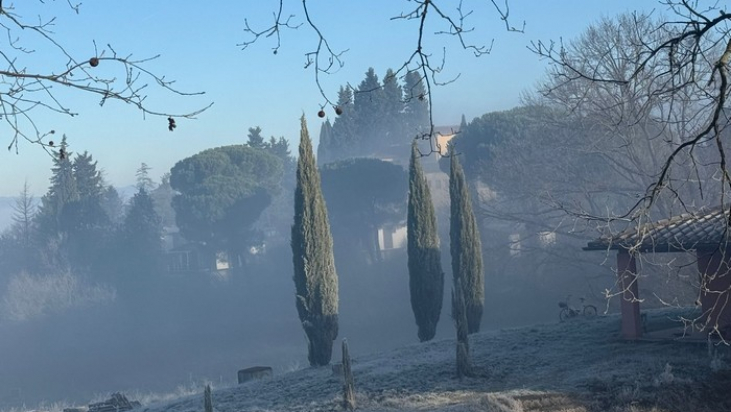






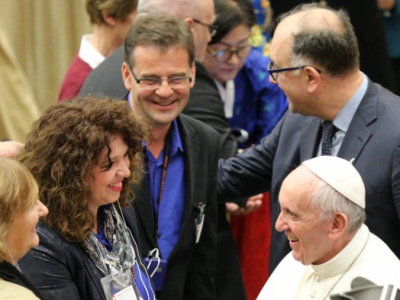
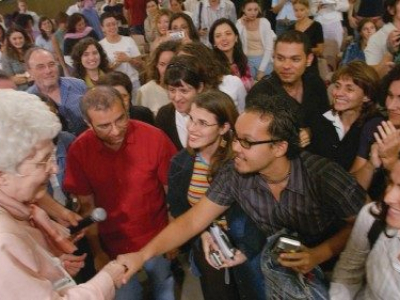
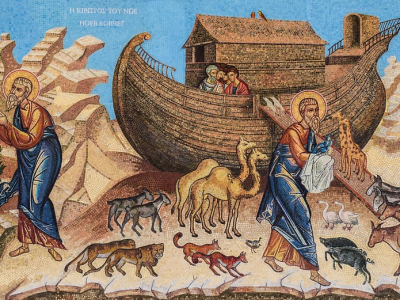
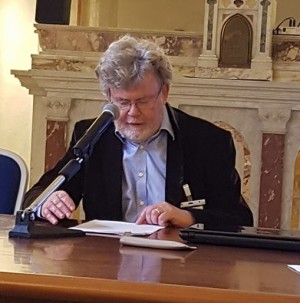 My first question is, do you think that the present capitalism, the 21st century capitalism, which is quite different from the 20th or 19th century capitalism, presents some religious dimension? When you look at what is going on in today's society, there are some religious foundations or religious roots what we see in very secular terms, because capitalism is strangely presenting itself as a sort of rationality, civilisation, post-ideological theory, but if you look really carefully, you find a lot of irrational, or, at least, religious “stuff”. What do you think about the religious dimension and nature of our capitalism?
My first question is, do you think that the present capitalism, the 21st century capitalism, which is quite different from the 20th or 19th century capitalism, presents some religious dimension? When you look at what is going on in today's society, there are some religious foundations or religious roots what we see in very secular terms, because capitalism is strangely presenting itself as a sort of rationality, civilisation, post-ideological theory, but if you look really carefully, you find a lot of irrational, or, at least, religious “stuff”. What do you think about the religious dimension and nature of our capitalism?  According to biblical humanism every jubilee year is an anniversary of mercy, but it is above all social, economic-political mercy: it was a crucial element in the jubilee year of the Jews to free those slaves who had become debt slaves. If we want this jubilee year not to remain a private and intimate matter of individual Christians, we must seize this great opportunity that Pope Francis gives us to bring about major initiatives of forgiveness and mercy in the economic, banking and civil world. One possible way of doing this would be to question ourselves about finance and about the many debts and slaves of our times who have been enslaved by a bad system.
According to biblical humanism every jubilee year is an anniversary of mercy, but it is above all social, economic-political mercy: it was a crucial element in the jubilee year of the Jews to free those slaves who had become debt slaves. If we want this jubilee year not to remain a private and intimate matter of individual Christians, we must seize this great opportunity that Pope Francis gives us to bring about major initiatives of forgiveness and mercy in the economic, banking and civil world. One possible way of doing this would be to question ourselves about finance and about the many debts and slaves of our times who have been enslaved by a bad system.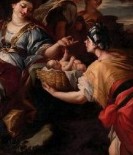 In Montgomery, Alabama, in a small Baptist church, I heard the most extraordinary sermon ever: the topic was the book of Exodus and the political struggle of the black in the South. From his pulpit the preacher mimed the exodus from Egypt, and he expounded the similarities with the present; he bent his back under the whip, he defied Pharaoh, he fearfully hesitated in front of the sea, he accepted the covenant and the law at the foot of the mountain.
In Montgomery, Alabama, in a small Baptist church, I heard the most extraordinary sermon ever: the topic was the book of Exodus and the political struggle of the black in the South. From his pulpit the preacher mimed the exodus from Egypt, and he expounded the similarities with the present; he bent his back under the whip, he defied Pharaoh, he fearfully hesitated in front of the sea, he accepted the covenant and the law at the foot of the mountain.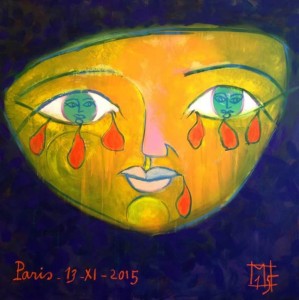 "And this blood smells the same as on the day when the brother told the other brother: »Let's go to the fields.«".
"And this blood smells the same as on the day when the brother told the other brother: »Let's go to the fields.«".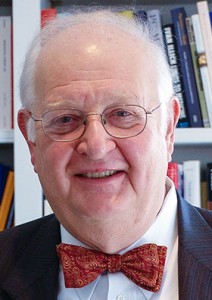
 Our era, the beginning of the twenty-first century will be remembered for the end of the critique of capitalism, which characterized much of the twentieth century. Capitalism has become the environment in which we live and move, and we are so immersed in it that we no longer have the cultural ability to look at it in order to analyze or criticize it, neither to ask it some fundamental questions of equality, justice and truth.
Our era, the beginning of the twenty-first century will be remembered for the end of the critique of capitalism, which characterized much of the twentieth century. Capitalism has become the environment in which we live and move, and we are so immersed in it that we no longer have the cultural ability to look at it in order to analyze or criticize it, neither to ask it some fundamental questions of equality, justice and truth.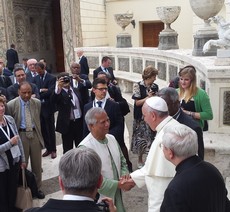 Luigino Bruni was one of the protagonists of the conference entitled "The Global Common Good: Towards a more inclusive economy” that brought together the highest authorities of global economy in the Vatican on 11th and 12th July. This was the first time he met Pope Francis in person and had lunch with him.
Luigino Bruni was one of the protagonists of the conference entitled "The Global Common Good: Towards a more inclusive economy” that brought together the highest authorities of global economy in the Vatican on 11th and 12th July. This was the first time he met Pope Francis in person and had lunch with him.
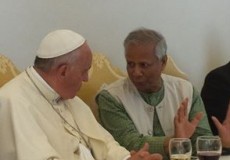 He chose that of Lazarus (of the parable), the beggar who is under the table, with the dogs, ‘who desired to be fed with what fell from the rich man's table’ (Luke 16). He who places himself next to Lazarus looks at the world from under the tables of the rich, with his eyes directed upwards. From there you can see things differently: Lazarus can see the rich man above himself, ‘clothed in purple and fine linen (...) who feasted sumptuously every day’. But he can also see heavens. Francis therefore invites us to do the same, to look at the world, but also heavens, along with the many Lazzaruses of today, many of whom are the product of our capitalism that tends to exclude. Being a passionate promoter of the Economy of Communion, and as a lover of justice, I could not feel more at ease in the company of Lazarus, and Francis (Bergoglio but also Francis of Assisi). At the end of the meeting I proposed to make this ‘Davos of the poor” a biannual occasion, and my invitation has a good chance of being accepted, so that this view of the world and of capitalism may become the expression of a constant caring attention, with criticism and love for our times.
He chose that of Lazarus (of the parable), the beggar who is under the table, with the dogs, ‘who desired to be fed with what fell from the rich man's table’ (Luke 16). He who places himself next to Lazarus looks at the world from under the tables of the rich, with his eyes directed upwards. From there you can see things differently: Lazarus can see the rich man above himself, ‘clothed in purple and fine linen (...) who feasted sumptuously every day’. But he can also see heavens. Francis therefore invites us to do the same, to look at the world, but also heavens, along with the many Lazzaruses of today, many of whom are the product of our capitalism that tends to exclude. Being a passionate promoter of the Economy of Communion, and as a lover of justice, I could not feel more at ease in the company of Lazarus, and Francis (Bergoglio but also Francis of Assisi). At the end of the meeting I proposed to make this ‘Davos of the poor” a biannual occasion, and my invitation has a good chance of being accepted, so that this view of the world and of capitalism may become the expression of a constant caring attention, with criticism and love for our times. «We have to protest and do it well: gambling is the scandal of our third millennium." Luigino Bruni is not a man to talk quietly. He makes it clear that "today those who loves the poor must also fight the addiction to gambling, such as slot machines," bringing up memories strikes and sit-ins. Have you walked into a bar for a coffee and seen the machines? One leaves, but not without protest.
«We have to protest and do it well: gambling is the scandal of our third millennium." Luigino Bruni is not a man to talk quietly. He makes it clear that "today those who loves the poor must also fight the addiction to gambling, such as slot machines," bringing up memories strikes and sit-ins. Have you walked into a bar for a coffee and seen the machines? One leaves, but not without protest.
